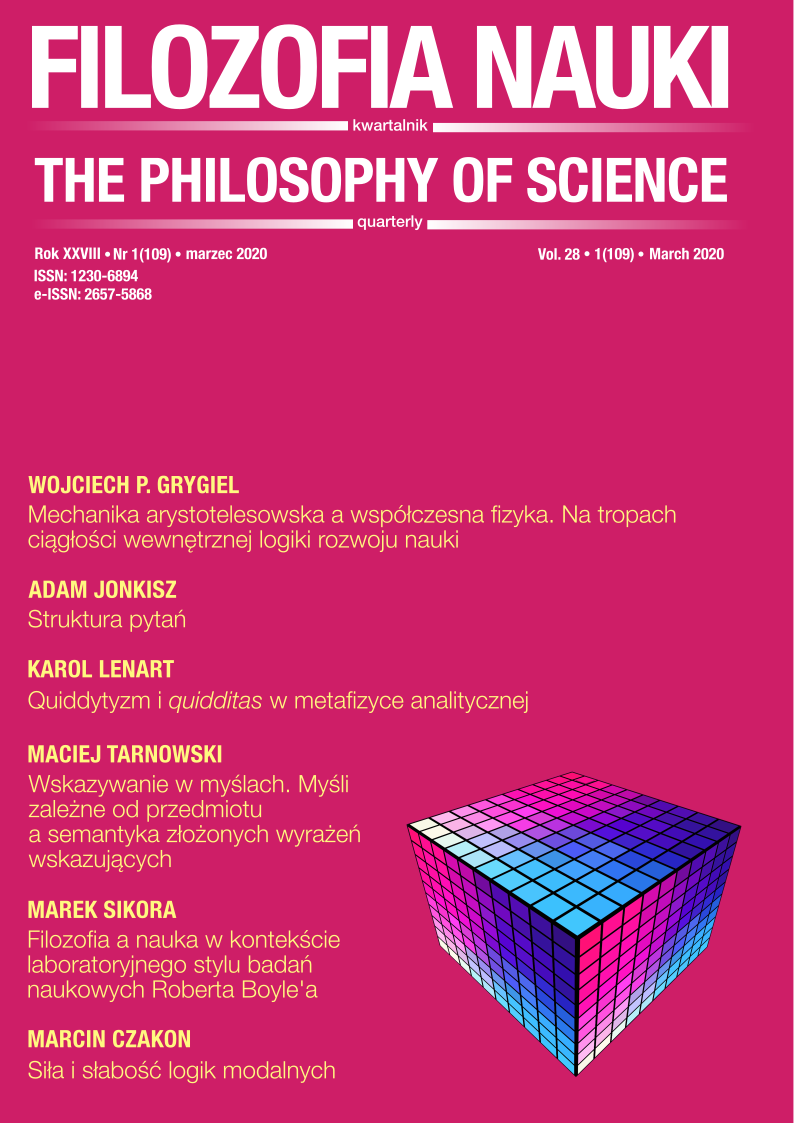Wskazywanie w myślach. Myśli zależne od przedmiotu a semantyka złożonych wyrażeń wskazujących
DOI:
https://doi.org/10.14394/filnau.2020.0004Słowa kluczowe:
demonstratives, complex demonstratives, object-dependent thoughts, folk psychology, externalism, referenceAbstrakt
In this article, I investigate the relation between the concept of object-dependent thoughts (ODTs) and the semantics of complex demonstratives. I begin by showing that a strong syntactic version of ODTs proposed by Adams and colleagues suffers from problems similar to those plaguing several semantic theories (Richard 1993, Larson, Segal 1995). Next, I turn to Eros Corazza’s counterproposal of perspectival thoughts and investigate whether it can provide us with promised explanatory benefits. I conclude by formulating an alternative picture of ODTs based on Evans’ work and showing that it successfully handles the problems posed for semantics of complex demonstratives. In order to do this, I introduce and defend a view of individual perceptive concepts that may serve as a mental counterpart of demonstration.
Bibliografia
Adams F., Stecker R., Fuller G. (1999), Object Dependent Thoughts, Perspectival Thoughts, and Psychological Generalisations, „Dialectica” 53(1), 47-59. https://doi.org/10.1111/j.1746-8361.1999.tb00062.x
Åkerman J. (2009), A Plea for Pragmatics, „Synthese” 170, 155-167. https://doi.org/10.1007/s11229-008-9365-z
Bach K. (2007), Searle against the World: How Can Experiences Find Their Objects? [w:] John Searle’s Philosophy of Language: Force, Meaning, and Mind, S. L. Tzohatzidis (ed.), Cambridge: Cambridge University Press.
Bach K. (2008), On Referring and Not Referring [w:] Reference: Interdisciplinary Perspectives, J. Gundel, N. Hedberg (eds.), Oxford: Oxford University Press, 13-58. https://doi.org/10.1093/acprof:oso/9780195331639.003.0002
Borg E. (2000), Complex Demonstratives, „Philosophical Studies” 97, 229-249. https://doi.org/10.1023/A:1018317423585
Braun D. (1994), Structured Characters and Complex Demonstratives, „Philosophical Studies” 74, 193-219. https://doi.org/10.1007/BF00989803
Burge T. (1974), Demonstrative Constructions, Reference, and Truth, „The Journal of Philosophy” 71 (7), 205-223. https://doi.org/10.2307/2025348
Ciecierski T. (2013), Nastawienia sądzeniowe. Wykłady z filozofii psychologii, Warszawa: Wydawnictwo Naukowe PWN.
Corazza E. (2004), Reflecting the Mind. Indexicality and Quasi-indexicality, Oxford: Oxford University Press. https://doi.org/10.1093/019927018X.001.0001
Evans G. (1980), Commentary on Jerry A. Fodor’s “Methodological Solipsism Considered as a Research Strategy in Cognitive Psychology” [w:] G. Evans, Collected Papers, Oxford University Press, Oxford 1985, 400-404.
Evans G. (1982), The Varieties of Reference, Oxford: Oxford University Press.
Fodor J. (1981), Methodological Solipsism Considered as a Research Strategy in Cognitive Psychology [w:] RePresentations, Brighton: Harvester Press, 225-253.
Garcia-Carpintero M. (1999), Searle on Perception, „Teorema: Revista Internacional de Filosofía”, 18(1), 19-41.
Gauker C. (2008), Zero Tolerance for Pragmatics, „Synthese” 165, 359-371. https://doi.org/10.1007/s11229-007-9189-2
Grudzińska J. (2007), Semantyka nazw jednostkowych, Warszawa: Wydawnictwo Naukowe Semper.
Hall J. K. (2013), Acquaintance and Mental Files, „Disputatio” 36, 119-132. https://doi.org/10.2478/disp-2013-0012
Kaplan D. (1989a), Demonstratives [w:] Themes from Kaplan, J. Almog, J. Perry, H. Wettstein (eds.), New York: Oxford University Press.
Kaplan D. (1989b), Afterthoughts [w:] Themes from Kaplan, J. Almog, J. Perry, H. Wettstein (eds.), New York: Oxford University Press.
Larson R. K., Segal G. M. A. (1995), Knowledge of Meaning: An Introduction to Semantic Theory, Cambridge, MA: MIT Press. https://doi.org/10.7551/mitpress/4076.001.0001
Latkowski A. (2016), O argumencie Corazzy przeciw pojęciu myśli zależnej od przedmiotu, „Filozofia Nauki” 24(3) [95], 43-72.
Neale S. (1993), Term Limits, „Philosophical Perspectives” 7, 89-123. https://doi.org/10.2307/2214117
Noonan H. (1991), Object-Dependent Thought and Psychological Redundancy, „Analysis” 1, 1-10. https://doi.org/10.1093/analys/51.1.1
Richard M. (1993), Articulated Terms, „Philosophical Perspectives” 7, 207-230. https://doi.org/10.2307/2214123
Roberts L. D. (1993), How Reference Works: Explanatory Models for Indexicals, Descriptions, and Opacity, New York: State University of New York Press.
Recanati F. (2012), Mental Files, Oxford: Oxford University Press. https://doi.org/10.1093/acprof:oso/9780199659982.001.0001
Searle J. R. (1983), Intentionality: An Essay in the Philosophy of Mind, Cambridge: Cambridge University Press. https://doi.org/10.1017/CBO9781139173452
Strawson P. F. (1950), On Referring, „Mind”, 59(235), 320-344. https://doi.org/10.1093/mind/LIX.235.320
Valberg J. J. (1992), The Puzzle of Experience, Oxford: Oxford University Press. https://doi.org/10.1093/acprof:oso/9780198242918.001.0001
Weinstein S. (1974), Truth and Demonstratives, „Noûs”, 8(2), 179-184. https://doi.org/10.2307/2214785



















 Filozofia Nauki | ISSN 1230-6894 | e-ISSN 2657-5868
Filozofia Nauki | ISSN 1230-6894 | e-ISSN 2657-5868